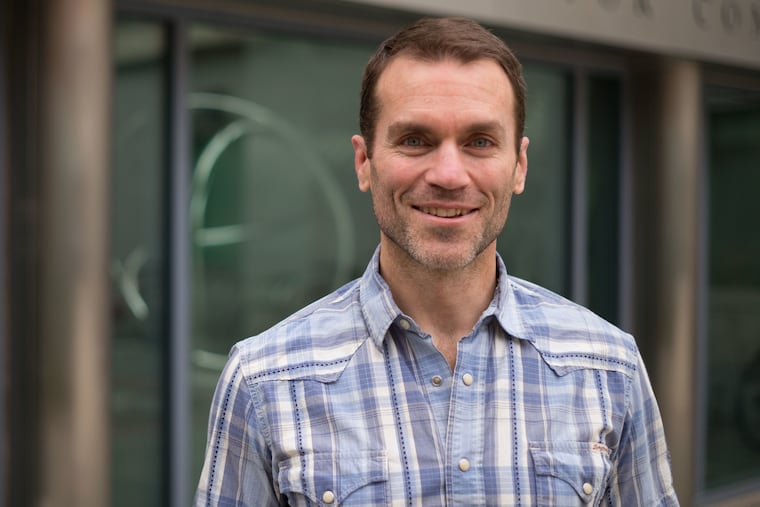Emile Bruneau, researcher and director of Penn’s Peace and Conflict Neuroscience Lab, dies at 47
Dr. Emile Bruneau, founder and director of the Peace and Conflict Neuroscience Lab at Penn's Annenberg School of Communication found conflict arises from lack of empathy.

Emile Bruneau, 47, a neuroscientist who researched human conflict at the University of Pennsylvania’s Annenberg School for Communication, died Sept. 30 of brain cancer at his Philadelphia home.
Dr. Bruneau was director of the school’s Peace and Conflict Neuroscience Lab, which applies cognitive science to understand intergroup conflict and to develop countermeasures. He also worked with the Beyond Conflict lab in Boston and was a lecturer at Annenberg.
Dr. Bruneau studied how hatred or dehumanization of people from other groups can lead to violence.
His work took him to Colombia, where he examined how former rebel guerrilla fighters with FARC reintegrated into society after years of war; to the conflicts in the West Bank and Israel, and to Hungary, where non-Roma teachers dehumanized Roma children in class.
“He always had his sights set on big, entrenched global conflicts,” Stephanie Bruneau, his widow, said. “That’s where his passion lay.”
Before becoming a scientist, Dr. Bruneau lived and worked in South Africa, volunteering for the Red Cross and at a hospital as apartheid was ending; in Northern Ireland at a peace camp for Protestant and Catholic boys; and in Sri Lanka, amid civil war.
He realized that intergroup conflicts, no matter where, were rooted in lack of empathy, the ability to see things from another group’s perspective.
In his graduate studies, Dr. Bruneau learned that brain cells were dynamic. Given his experience, he said he wanted to research how people’s minds could change to reduce the causes of conflict.
“We lost the best champion for world peace we’ve had in a generation,” his father, William Bruneau, said.
For example, one research study examined the idea of “collective blame," the force that, for example might lead some in Europe and the United States to stigmatize all Muslims for an act of terrorism committed by an individual Muslim.
However, the researchers found, very few Americans blamed all white Christians when a white Christian, Dylann Roof, killed nine Black church members in a Charleston, S.C., terror attack in 2015.
“The human brain has a set of biases, and many of these biases lie across in-group and out-group lines.,” Dr. Bruneau told Penn Today.
In experiments, he and other researchers found that a simple intervention of calling out the hypocrisy reduced some of the anti-Muslim bias.
Stephanie Bruneau said her husband also met with former white supremacists in Philadelphia to find out what had turned them away from extremist ideology.
“It was always an unexpected act of kindness that changed their minds,” she said, adding he believed in change.
“Emile spoke with such kindness and optimism and hope about the world around him, even as his research forced him to focus on some of the most intractable and violent problems that plague us as a people," Annenberg dean John L. Jackson Jr. said in a tribute the school published.
Emile Gabriel Bruneau was born in Stanford, Calif., to Linda Hahn Bruneau and William Bruneau in 1972. Shortly after his birth, Dr. Bruneau’s mother was diagnosed with schizophrenia, which he said influenced him to study the brain.
In 1994, Dr. Bruneau earned his bachelor’s degree in human biology from Stanford University, where he was a star on the men’s rugby team.
For seven years, he taught high school and elementary school in the Bay Area. During this time, in 1999, he also coached the Stanford women’s rugby team to a national championship.
He earned his Ph.D. in cellular and molecular neuroscience from the University of Michigan in 2008 and then studied as a postdoctoral fellow for seven years at the Massachusetts Institute of Technology.
He and Stephanie Elson Bruneau married in 2010 and moved to Philadelphia in 2015, when he began at the Annenberg School as a visiting scholar.
Dr. Bruneau was featured last year in an episode of the Discovery Channel’s series Why We Hate. His episode was titled “Hope.”
In addition to his wife and father, Dr. Bruneau is survived by a daughter, Clara, and a son, Atticus; his stepmother, Helen Jeavons Bruneau; and his stepsister.
He was buried in a wildflower meadow at West Laurel Hill Cemetery, where he and his family tended bees.
Donations in honor of Emile Bruneau may be made to the Germantown Mutual Aid Fund or the Miquon School’s Financial Aid Fund.